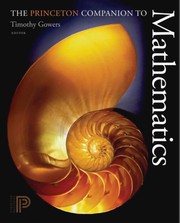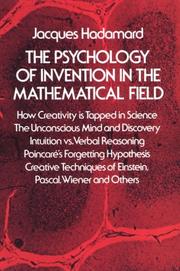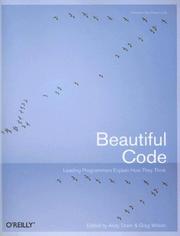The Princeton Companion to Mathematics edited by Timothy Gowers, June Barrow-Green and Imre Leader - ISBN 9780691118802 - PUP 2008
Motivation
Getting an overview of mathematics as a whole, not as a fragmented set of fields. Also highly recommended by Wagner. Also, wanting to be able to leverage Shun-ichi Amari's work (including Methods of Information Geometry) and thus requiring a better understanding of several key mathematical notions.
Pre-reading model
Draw a schema (using PmGraphViz or another solution) of the situation of the area in the studied domain before having read the book.
Reading
* article to read
** X read article
- I Introduction
1 What Is Mathematics About?
1 Algebra, Geometry, and Analysis
2 The Main Branches of Mathematics
2 The Language and Grammar of Mathematics
- 3 Some Fundamental Mathematical Definitions
- 4 Functions between Algebraic Structures
- 3 Eigenvalues and Eigenvectors
- 6 What Is Geometry?
9 Manifolds and Differential Geometry
10 Riemannian Metrics
- 4 The General Goals of Mathematical Research
- III Mathematical Concepts
- 17 Dimension
- 18 Distributions
- 21 Elliptic Curves
56 Matroids
- "matroids form a natural home for many optimization problems" (p248)
- IV Branches of Mathematics
- 2 Analytic Number Theory
- 3 Computational Number Theory
4 The Riemann Hypothesis and the Distribution of the Primes
- 6 Algebraic Topology
- 7 Differential Topology
20 Computational Complexity by Oded Goldreich and Avi Wigderson
- "the P versus NP question is, in a sense, asking whether this kind of creativity can be automated." (p266) encountered earlier in WithoutNotesSeptember11#AviWigderson
7 The Bright Side of Hardness
- VI Mathematicians
33 Niels Henrik Abel
35 Carl Gustav Jacob Jacobi
36 Peter Gustav Lejeune Dirichlet
37 William Rowan Hamilton
49 Georg Friedrich Bernhard Riemann
53 Sophus Lie
61 Jules Henri Poincaré
63 David Hilbert
65 Jacques Hadamard
88 Andrei Nikolaevich Kolmogorov
- (to find) Information Theory and Algorithms (seems inexistant!)
89 Alonzo Church
91 John von Neumann
92 Kurt Gödel
94 Alan Turing
- 96 Nicolas Bourbaki
- VII The Influence of Mathematics
- 2 Mathematical Biology
- 9 Phylogenetics and Graph Theory
- 4 The Mathematics of Traffic in Networks
- 5 Flow Control in the Internet
- 5 The Mathematics of Algorithm Design
- 7 Mathematics and Cryptography
- VIII Final Perspectives
- 6 Advice to a Young Mathematician
III Alain Connes
- "Each generation builds a mental picture that reflects their own understanding of this world. They construct mental tools that penetrate more and more deeply into it, so that they can explore aspects of it that were previously hidden." (p1012)
See also
Tools
- Mathematics Examples of Wolfram|Alpha
- Sage Notebook create, collaborate on, and publish interactive worksheets. In a worksheet, one can write code using Sage, Python, and other software included in Sage.
- PLUME, Thème : mathématiques logiciels utilisés dans les domaines de la recherche, de l’enseignement en mathématiques (pures comme appliquées), mais aussi ceux relevant de cette science (calcul scientifique, statistiques …) et pratiqués dans d’autres disciplines (physique, chimie, finance …).
- Tricki store of useful mathematical problem-solving techniques.
Overall remarks and questions
- main editor Timothy Gowers started the polymath project "using the comment functionality of his blog to produce mathematics collaboratively".
- seems there is no reference to Ronald Fisher
Synthesis
So in the end, it was about X and was based on Y.
Critics
Point A, B and C are debatable because of e, f and j.
Vocabulary
(:new_vocabulary_start:)
new_word
(:new_vocabulary_end:)
Post-reading model
Draw a schema (using PmGraphViz or another solution) of the situation of the area in the studied domain after having read the book. Link it to the pre-reading model and align the two to help easy comparison.
Categories
Back to the Menu
Other read books linking to the The Princeton Companion to Mathematics page :
Back to the Menu
 Fabien Benetou's PIM
Fabien Benetou's PIM











